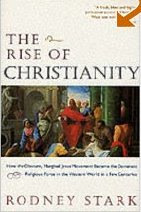
Is there hope for the privileged?
Sometimes you hear that the privileged and educated are not open to the gospel. It is almost a truism in some circles that open people are poor, less educated, and rural. When you look around the areas of the world where there are populations of new believers, that mostly appears to be the case. Philip Jenkins, author of The Next Christendom, goes so far as to say that: “By 2050… [the world’s average Christian] …is above all likely to be an extremely poor person...” (1)
Some have been relating to sections of the world’s middle and upper classes for decades without seeing a single person coming to faith in Christ, and few continuing in their faith. This is no small matter since for example in
Some encouragement from the early church.
I’ve recently been reading a book called The Rise of Christianity: How the Obscure, Marginal, Jesus Movement Became the Dominant Religious Force in the Western World in a Few Centuries by Rodney Stark. Reading Stark’s study of the early church has encouraged me to harbor hope for the urban privileged and educated. The overall thrust of the Bible certainly has a special concern for the poor, but it also states that God loves the whole world. There are instances of God redeeming rulers, priests, tax-collectors, and apparently large privileged urban populations.
Stark argues that a consensus has developed among New Testament historians that the early church was not mainly made up of the poor and uneducated, but rather the early church was based in the middle and upper classes, was relatively privileged, educated and highly urban. He also notes that statistically there is no reason to believe there were any rapid mass movements to the faith happening. The numbers could have been extremely small in the early years and with only very modest growth rate could have reached half the population of the
-Sdawg
(This was a guest post authorized by the Swooping Crane.)
NOTES
1. “Companions of Life” [http://www.christianvisionproject.com/2007/03/companions_of_life.html]


